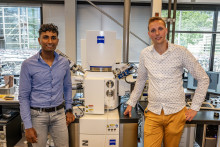Every three years, surveys conducted by the Rathenau Institute show that the Dutch population has a high level of confidence in science. The surveys also reveal, however, that people have reservations about commissioned research, for instance by the government.
The Rathenau Institute decided to get to the bottom of this. After all, people do expect that very same government to base its policy on scientific knowledge, and to use research findings to solve the major issues facing Dutch society – such as the coronavirus pandemic.
Critical citizens
Rathenau conducted extensive interviews with 53 respondents divided over nine focus groups. Most groups were composed of different types of people, based on characteristics such as age, gender and level of education. But there were also separate groups made up entirely of young adults and ‘critical citizens’ – people involved in action groups and other organisations that oppose government policies.
One thing all respondents had in common was that their trust is conditional, the interviews show. They strongly value independence, for instance. They don’t mind it if the government provides input to researchers, but it should not exert any pressure whatsoever on scientists to adjust their findings. By the same token, the respondents believe that scientists should leave policymaking to the politicians.
Financial independence is also seen as an important prerequisite. Some fear that ‘he who controls the purse strings makes the rules’. In the group of critical citizens, it was suggested that universities should receive more fixed research funding again, 'so that they are less susceptible to government interference'.
Understandable language
Transparency is also a key factor. The respondents believe that scientists should provide clear explanations of their research, and preferably in understandable language. They don’t want to feel like scientists are 'withholding, concealing or distorting” information. When it comes to government-commissioned research, it is especially important that researchers be able to publish the results of their work “uncensored and without any restrictions'.
But, as the group of young adults points out, it is also vital that people know where to find scientific information – and that they’re able to understand it. They suggest that children across all levels of education should be taught about science.
Conflicting reports in the media don’t make it any easier for people to understand scientific developments either, the respondents indicate, citing the confusion at the beginning of the pandemic about the effectiveness of face masks as an example. Such discussions, they say, should not be held 'in the public arena'.
Intuition
The interviews also highlighted that people are not always rational. In assessing the reliability of a study, they are also guided by their intuition and by previous – sometimes negative – experiences with science. That’s why it may be useful to more frequently involve people from outside the academic community in scientific research, the study concludes.







